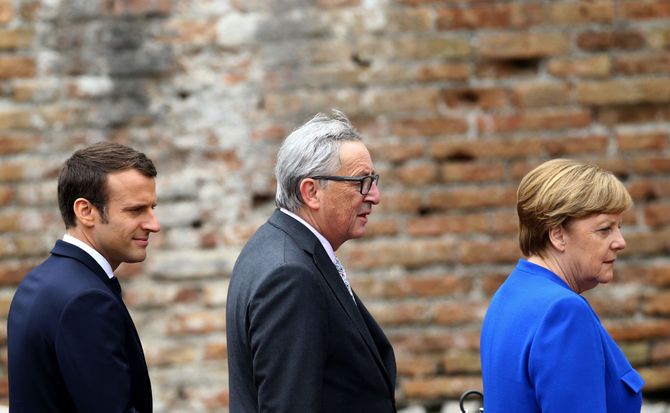Western leadership leaves much to be desired
Huge economic imbalances are weighing on Western economies, while global power shifts threaten the world order. But those are not the problems that leaders in Europe and many politicians in the U.S. have chosen to focus on.

Though it began bubbling to the surface much earlier, the financial crisis broke out in 2007-2008. It was followed by economic and sovereign debt crises and evolved into a crisis of political institutions. The adverse effects were not due to any failure of the market, as many claim, but instead from a political failure exacerbated by parts of the financial industry aligning their policies with politicians’ greed. Governments needed the support of the financial industry to fund their overspending and enticed (mainly) the large banks with regulatory incentives.
The political parties that have shared power since World War II – in Europe mainly Christian Democrats and Social Democrats – became too comfortable and were led to believe that they had the right to govern. Elections and party discipline became the most important factors, with two negative consequences. First, people with different or “outside-the-box” ideas were eliminated by the party “elites.” Second, the parties used state funds for exaggerated welfare programs and other handouts to buy the favor of their clientele. This is a corruption of representative democracy, denigrating parliaments and hurting countries’ long-term interests.
None of the underlying problems were addressed. High deficits continue in most countries. Low interest rates and monetary expansion allow for this, but only to the detriment of savers, pension funds and future generations.
Signs of weakness
People are rightfully fed up with these old parties, and a whole new spectrum of political players is developing. However, the establishment is clinging to power and trying to rule from a position of weakness. These parties misuse meek institutions or take shortcuts around legal and constitutional principles. Like all weak organizations, they attack scapegoats.
In Germany, the Christian Democrats and Social Democrats were the biggest losers of the last election. Nevertheless, after six months of weird negotiations, they formed a wobbly coalition with a populist, left-wing agenda dictated by the junior partner, the Social Democrats. The program contains more spending, without considering long-term economic and security concerns.
The establishment is clinging to power and trying to rule from a position of weakness.
In France, President Emmanuel Macron created a new party, but it is part of the established, political elite of the left. He plays the part of European visionary, but continues with an unsustainable agenda of deficits, a planned economy and European centralization. Also, his respect for the constitution is limited: he often circumvents parliament, local governments and professional associations, and attacks the media.
Italy just had elections. The outcome makes it difficult to build a workable government. This is nothing new there and the good side of it is that countries – especially Italy – can prosper for quite a while without a government. Belgium, which went 589 days without one in 2010-11, is a good example.
In the United Kingdom, the government’s position has weakened and there is a danger that the Labour Party, led by Jeremy Corbyn, could win the next elections. Mr. Corbyn’s program is clearly Marxist and would ruin all of the sectors of the British economy that still work well.
This is the situation in Europe’s four largest countries. The European Union, shirking its crucial responsibility to maintain a free internal market and the continent’s cohesion, applies politics based on “values” that are easily adapted for political expediency and which are often misused to exercise power. The leadership is neither charismatic nor effective, besides issuing protectionist regulations.
It seems that the Brexit negotiations are being conducted in a way meant to punish the UK, instead of reaching a mutually beneficial solution. At the same time, the European Commission, the majority of the European Parliament and most member states find satisfaction in criticizing Hungary and Poland. This is an unnecessary intervention in national politics and will further weaken European cohesion. It is a sign of weakness.
Disasters waiting to happen
Meanwhile, major problems remain unsolved. Sovereign debt is growing: the situation is already out of control, but the only solution being offered is to continue down the path of more debt. This will result in an even bigger disaster later. The political movements that are marginalized as “populist” and “radical” will become stronger, as it does not appear that the old parties will return to principles. Another example is the rather more emotional, expedient energy policy rather than one that is fact-based – especially in Germany. This jeopardizes energy security and has all the ingredients needed to hamstring the industrial base.
It appears that attacking President Trump is more important than solving the real problems.
The United States, too – where an outsider became president – is dominated by a self-destructive, emotional, biased debate, in which one side is trying to prove that Donald Trump’s campaign was supported by Russia and actively used Moscow’s help to smear Hillary Clinton. So far, there is not much flesh on the bones for these allegations, besides a few meetings. It appears that attacking President Trump is more important than solving the country’s real problems. The hysteria also limits the administration’s ability to implement a pragmatic foreign policy toward Russia.
The problems Western democracies face are not limited to their economies – huge geopolitical shifts are under way, with players such as China emerging global powers. Throughout all of this, the West’s leadership makes a very poor impression.
